Michael Dibdin - Blood rain
Here you can read online Michael Dibdin - Blood rain full text of the book (entire story) in english for free. Download pdf and epub, get meaning, cover and reviews about this ebook. genre: Detective and thriller. Description of the work, (preface) as well as reviews are available. Best literature library LitArk.com created for fans of good reading and offers a wide selection of genres:
Romance novel
Science fiction
Adventure
Detective
Science
History
Home and family
Prose
Art
Politics
Computer
Non-fiction
Religion
Business
Children
Humor
Choose a favorite category and find really read worthwhile books. Enjoy immersion in the world of imagination, feel the emotions of the characters or learn something new for yourself, make an fascinating discovery.

- Book:Blood rain
- Author:
- Genre:
- Rating:5 / 5
- Favourites:Add to favourites
- Your mark:
- 100
- 1
- 2
- 3
- 4
- 5
Blood rain: summary, description and annotation
We offer to read an annotation, description, summary or preface (depends on what the author of the book "Blood rain" wrote himself). If you haven't found the necessary information about the book — write in the comments, we will try to find it.
Blood rain — read online for free the complete book (whole text) full work
Below is the text of the book, divided by pages. System saving the place of the last page read, allows you to conveniently read the book "Blood rain" online for free, without having to search again every time where you left off. Put a bookmark, and you can go to the page where you finished reading at any time.
Font size:
Interval:
Bookmark:
Michael Dibdin
Blood rain
PART ONE
What it all seemed to come down to, in those early days when everything looked as clear as the sea at sunrise, was the question of exactly where, how and when the train had been made up. It was only much later that Aurelio Zen came to realize that the train had been made up in a quite different sense, that it had never really existed in the first place.
At the time, the issues had seemed as solid as the train itself: a set of fourteen freight wagons currently quarantined on a siding in the complex of tracks surrounding the engine sheds at Piazza delle Americhe, on the coast to the north of central Catania. The site where the body had been found was within the territory of the provincia di Catania, and hence under the jurisdiction of the authorities of that city. So far, so good. From a bureaucratic point of view, however, the crucial factor was where and when the crime if indeed it was a crime had occurred. As all those concerned were soon to learn, none of these points was susceptible of a quick or easy answer.
Even assuming that the records provided by the State Railway authorities had been complete and credible, and no one in his right mind would have been prepared to make such an assumption, only a few unequivocal facts emerged. The first was that the train had originally left Palermo at 2.47 p.m. on 23 July. At this point it consisted of seven wagons, three of them empties commencing a long journey back to their depot in Catania, the others loaded with an assortment of goods ranging from empty wine bottles to drums of fertilizer. It was not clear whether or not the death chamber, as it was later dubbed by the media, had been one of these.
Having trundled along the north coast as far as the junction of Castello, the train turned inland, following a river valley up into the remote and largely depopulated centre of the island. Here, always assuming that the scanty records of the Ferrovie dello Stato were to be trusted, it had disappeared from official view for the best part of a week.
When it re-emerged on 29 July, at the junction of Caltanissetta-Xirbi, the convoy consisted of twelve wagons, including some or possibly all of the seven which had originally started from the islands capital. There had apparently been a lot of starting and stopping, of shunting and dropping, during the long, slow trip along the single-track line through the desolate interior of Sicily. No one was in any great hurry to get anywhere, and the staff in charge tended to make on-the-spot decisions about the composition and scheduling of such freight trains on a pragmatic basis, Without bothering their superiors about every last detail. If the odd empty wagon got uncoupled or hitched up at some point, to keep the load down to what the ancient diesel locomotive could handle on the steep inland gradients, that was not regarded as a matter that needed to be brought to the attention of the officials in Palermo. Nor would the latter have been pleased to be informed about such minutiae, it being notorious that they had better things to do than their jobs.
At all events, the resulting train whatever its exact composition had continued via Caltanissetta and Canicattii to the coast and then headed east, picking up three (or possibly four) more wagons and losing one (or possibly two) to form the set now reposing on a secluded siding in Catania, its intended destination all along.
According to the subsequent deposition of the driver and his assistant, however, it had been stopped by a flagman near the unmanned station of Passo Martino, just south of Catania, and diverted into a siding there for several hours. This, they claimed to have been told, was due to emergency repair work on a bridge to the north. At length the flagman gave them the all-clear, and the freight train completed its journey without further incident, arriving on 1 August towards eight oclock in the evening.
It was two days later that the State Railway offices in Catania received the phone call. The speaker had a smooth, educated voice, but his accent was unfamiliar to the official on duty. Apparently he wanted to report a public nuisance in the form of a wagonload of rotting goods parked on a siding at Passo Martino. The smell, he claimed, was dreadful, and what with the heat and the usual stench from the swampland all around, it was driving everyone out of their minds. Something should be done, and soon.
The railway official duly passed the message on to his superintendent. Maria Riesi would normally have dismissed the matter as just another crank call from some disgruntled eccentric, but under the circumstances she was only too happy to have an excuse to leave her stifling office and drive all windows open, and the new Carmen Consuela album blasting from the speakers down the autostrada to Piano dArci, and then along the country road which zigzagged across the river and the railway tracks to the lane leading down to the isolated station. She didnt believe for a moment that there would be anything there, but that didnt matter. The call had been duly logged and noted, so by going out to investigate she was merely doing her job.
Much to her surprise, there was a wagon there, parked on a set of rusted rails almost invisible beneath a scented mass of wild thyme punctuated by some scrubby cacti. There were other, less pleasant smells in the air too, and a lot of flies about. The sun was a strident scream, the heat reflected from every ambient surface its sonorous echo. Maria Riesi walked along the crumbling platform towards the rust-red bulk of the boxcar.
As a matter of routine, the first thing she checked was the waybill clipped into its holder beside the doors. This document listed Palermo as the origin of the wagon, and its destination as Catania. The writing was a mere scrawl, but the contents appeared to be listed as lemons, and the bill had been over-stamped in red with the word PERISHABLE. Judging by the swarms of flies and the nauseating stench, whatever the wagon contained was not only perishable, but had in fact perished. This came as no surprise to Maria, who knew very well that perishable goods did not travel in this type of wagon. It only remained to find out their nature, and if possible their provenance, and then write an anodyne report handing the whole matter over to Central Headquarters in Palermo. Let them decide whose head should roll.
Even standing on tiptoe, Maria Riesi could not reach the handle to open the wagon. But although short, she was both resourceful and strong. The station had been abandoned for years, but one of the large-wheeled baggage carts used to unload goods and luggage was still parked in a weed-infested corner of the platform, its handle propped up against the wall of a shed. Maria marched over and, grunting from the effort, managed to get it moving and to haul it over to the stalled wagon. She clambered up on to the slatted wooden floor of the cart, her silk blouse stained with sweat, and, by dint of putting her whole weight on the lever which secured the sliding door, eventually forced it open.
Everyone subsequently agreed that she had done more than could have been expected under the circumstances, and that it was not her fault that she vomited all over herself and the baggage cart. The post-mortem was conducted that evening, in an army tent hastily erected at the end of the platform, well away from the assembled group of policemen, magistrates and reporters. The remains had been removed from the wagon earlier by hospital personnel clad in plastic body suiting equipped with breathing apparatus. If the results of the examination were not very informative, this was due more to the condition of the corpse than to the pathologists understandable desire to conclude the proceedings as soon as possible. The most he could say, based on a preliminary visual examination of the fly larvae present, was that the victim had been dead for at least a week.
Font size:
Interval:
Bookmark:
Similar books «Blood rain»
Look at similar books to Blood rain. We have selected literature similar in name and meaning in the hope of providing readers with more options to find new, interesting, not yet read works.
Discussion, reviews of the book Blood rain and just readers' own opinions. Leave your comments, write what you think about the work, its meaning or the main characters. Specify what exactly you liked and what you didn't like, and why you think so.



